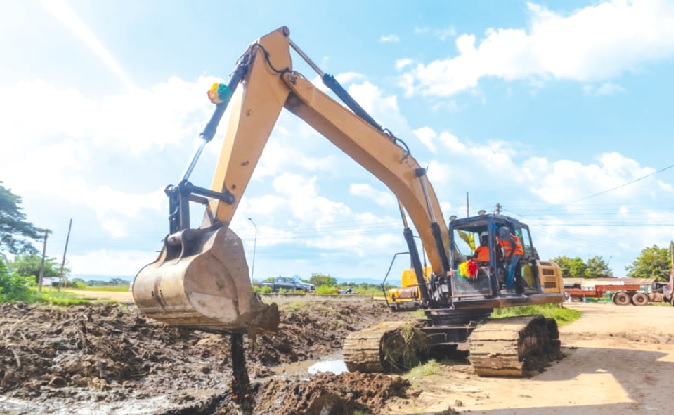The sod-cutting ceremony for the completion of phase II of the rehabilitation and modernisation of the Kpong Irrigation Scheme marked a crucial milestone in the nation’s efforts to combat food insecurity and promote sustainable farming practices.
Last week the Minister of Food and Agriculture, Dr Bryan Acheampong, presided over the formal handover ceremony of the KIS site to Top International Engineering Company (TIEC) for rehabilitation.
The event, held in Akuse, drew key figures from government, international organisations and local communities, underscoring a collaborative approach to agriculture reform in Ghana.
This initiative is part of the broader West Africa Food System Resilience Programme (FSRP), which aims to cultivate robust food systems to withstand challenges arising from climate change and market fluctuations.
As Ghana takes the lead in promoting sustainable agricultural methods, the modernisation of the Kpong Irrigation Scheme is expected to serve as a blueprint for future agricultural projects throughout the country.
Model for future development
The rehabilitation of the Kpong Irrigation Scheme, financed with $22.5 million from the World Bank, builds on prior investments of over $90 million dedicated to irrigation modernisation across Ghana from 2019 to 2021.
The speech delivered by the minister emphasised that $62 million had already been allocated to the first phase of the Kpong scheme, reflecting the government’s steadfast dedication to enhancing agricultural productivity.
The Kpong scheme is set to become a hallmark of sustainable irrigation practices, contributing to the enduring resilience of food production systems.
Similar projects, including the Weta, Vea and Tanoso irrigation schemes, align with the overarching goal of empowering farmers and communities.
As the sod was cut and the sun dipped below the horizon, it marked not just the start of a new project, but a promising era in agricultural resilience, positioning Ghana to better tackle the implications of climate change while striving for food security.
With collaborative efforts and innovative strategies leading the way, the future of agriculture in Ghana appears bright.
The rehabilitation project, with a budget of $22.6 million and support from the World Bank, aims to enhance crucial infrastructure, including irrigation systems, drainage facilities, and access roads.
Additionally, it plans to introduce advanced water delivery technologies, ultimately benefiting thousands of smallholder farmers in the region.
Historically, the Kpong Irrigation Scheme has been crucial for the agricultural economy, particularly for smallholder rice farmers and large-scale operations such as Golden Exotic.
Upon completion, this project is expected to significantly increase crop yields and improve the livelihoods of local farmers amid environmental challenges.
Other irrigation developments
GIDA is currently leading some of the most ambitious irrigation projects in the country’s history, including the development of 19 small earth dams in the Northern regions and the esteemed Afram Plains Economic Enclave Irrigation project in the Eastern and Ashanti regions.
This project alone will increase our existing public irrigation schemes by an impressive 5,000 hectares, expanding them from 19,000 hectares. Additionally, the ministry is advancing the Tamne Irrigation Project’s expansion, which will add 800 hectares, alongside the rehabilitation of the Vea Irrigation Scheme, covering 750 hectares.
Upon completion of these initiatives, the total area under public irrigation schemes will rise to 24,000 hectares, with the strategic vision potentially leading to another 5,000 hectares being brought under irrigation.
Agricultural resilience
During the sod cutting ceremony, Deputy Minister for Agriculture, Yaw Frempong Addo, who represented the Minister for Food and Agriculture, underscored the occasion’s significance.
Echoing this year’s National Farmers’ Day theme: “Building Climate-Resistant Agriculture for Sustainable Food Security”, Dr Bryan emphasised the need for cooperative action among
ECOWAS nations to address food system risks linked to climate change.
“The West Africa Food System Resilience Programme (FSRP) is designed to enhance preparedness against food insecurity and fortify food systems,” the World Bank Country Director and Task Team Leader for FSRP in West Africa and Ghana, Ashwini Rekha Sebastian, stated.
This collaborative endeavour represents a critical advancement in strengthening food systems not only in Ghana but across the sub-region.
Innovative solutions
The FSRP emphasises innovative and adaptive solutions across various developmental areas. Key initiatives include establishing veterinary and plant laboratories, seed banks, and rehabilitating critical warehousing and market facilities to foster effective regional trade.
Integrated support for value chain participants, particularly concerning staple crops such as rice, maize, broiler poultry, soybeans and tomatoes, is strengthened by strategic investments in technology.
The government is also working with the Ghana Meteorological Agency to provide tailored weather and climate information services through new equipment such as automated weather stations—an insightful approach to agricultural adaptation.
Encouraging youth engagement
Against this backdrop of progress, there is a renewed call for Ghanaians, especially the youth, to seize opportunities presented by the Planting for Food and Jobs (PFJ 2.0) initiative.
“We urge the youth to explore business prospects in the agricultural sector,” the minister emphasised, encouraging them to engage with modern agricultural practices that promise sustainability and growth








